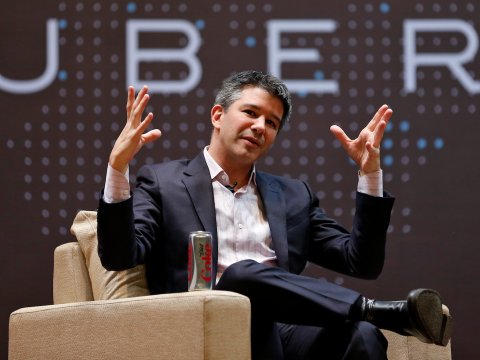Hey Travis,

Uber and you have been all over the news lately. Much of the public is now privy to some rather unbecoming information about your company. I’m actually in the process of writing a book about another company who lost its way during the Great Recession (2008-2009), or as the recent Highline article calls it, “The Great F*ckening.”
Not only are there several similarities between this company and Uber. You actually added its former CEO, John Thain, to your board. When I read about your appointment of Thain to Uber’s board last month, I was rather perplexed.
So with the potential of today being a red letter day for you, I thought I’d write you this letter. Today, according to Recode, SoftBank is offering your investors:
“Just under $33 per share in an attempt to purchase up to one fifth of the company. The deal is important not just because of the massive amount of cash that would change hands, but also because the deal would trigger a series of reforms meant to mollify the warring factions in Uber’s boardroom.
Employees and institutional investors each have to decide whether that share price — a 30 percent discount from the company’s last valuation — is enough of a payout. If the SoftBank-led group is unable to cobble together at least 13.4 percent of the shares in the company, then the transaction fails and Uber’s governance crisis would deepen.”
This bring me back to your appointment of John Thain to the board of Uber. You must be rather proud of this appointment too, as it is your most recent tweet on your timeline. On November 29, you tweeted: “Ursula [Burns] & John [Thain] bring 50+ years of combined executive experience to @Uber’s board—helping the company become stronger now & for the future.”
John Thain is not a man of whose history I would highlight. I would say I’m quite familiar with Thain’s cunning bravado. You see, John Thain became the CEO of Merrill Lynch in December of 2007 and I joined Merrill’s “thundering herd” in January of 2008. But he didn’t last very long. Thain was fired (or “resigned”) by January of 2009. And I had the best seat in the house to witness a full year’s worth of leadership by your boy John Thain. It was not good. Where should I begin?
There was a few reasons he was fired. But let’s start with his spending habits. Within months of joining Merrill—mind you, while Merrill was being enveloped by the sub-prime crisis—Thain spent $1.2 million of the company’s funds on redecorating his office suite. This included $87,784 for an area rug, $25,713 for a mahogany table, $68,179 for a 19th century credenza, $35,115 commode on legs, $18,784 for a George IV chair, and $1,405 for a parchment waste can.
Next, in the throes of its government-assisted Bank of America bailout, which needed federal funds during the height of the financial crisis, Thain moved all executive bonuses up a quarter and altered the ratio of cash to stock, both actions being rather odd. So even though Merrill Lynch has an unexpected $15 billion dollar loss in the fourth quarter of 2008, Thain awarded an accelerated, guaranteed bonus of $4 billion to its executives just before its bailout by Bank of America, which required another $20 billion in taxpayer money.
As highlighted by ABC News: “The top 14 [executives] got $250 million and the top 159 received over $858 million in bonuses. Overall, sources said, 694 employees at Merrill received bonuses in excess of $1 million. The bank’s four top executives received $121 million.”
These bonuses were so over-the-top that “SuperThain” was forced to reappear before former Attorney General (now New York Governor) Andrew Cuomo via a court-ordered deposition — to admit more details of his controversial 11th hour bonuses, according to ABC News.
Travis, if you really want to change the culture of Uber, you wouldn’t have appointed John Thain to your board. From Thain’s track record at my former firm, it is obvious he doesn’t prevent crisis, he accelerates them. He doesn’t improve cultures, he poisons them. Thain’s actions spoke much louder than his words. And so do your actions.
I bet John Thain pushes for the Softbank bailout of Uber. And I bet he helps to accomplish this feat. After all, he’s always been good at two things—getting paid and getting bailed out.

